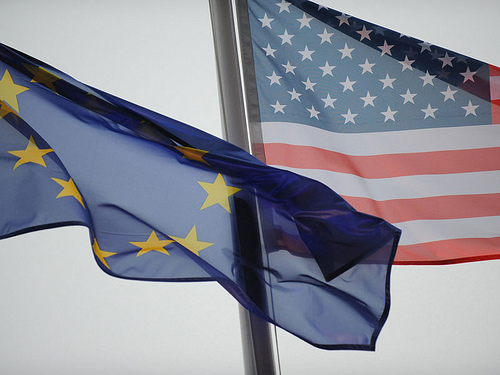
Europe is divided as the Netherlands and the U.K. sue Iceland, politics cloud the one year anniversary of the air disaster in Smolensk, and Italy uses "dirty tricks" to deal with the influx of refugees.
HEADLINES:
German Army Criticized For Failing to Protect UN Workers (Spiegel)
Although the German ISAF troops stationed in northern Afghanistan were promptly informed of an April 1 attack on a UN mission, they didn’t deploy. Critical questions have been raised about the Bundeswehr’s initial inaction.
Global weapons spending slows as Europe slashes military budgets (Deutsche Welle)
A record $1.6 billion was spent on weapons in 2010. Yet, according to a study by a leading Stockholm think-tank, the increase slowed over 2009, and military expenditure in Europe has even shrunk.
Defence ministry to scrap 12,000 jobs (Radio Netherlands Worldwide)
The defence ministry is to sack some 6,000 staff and scrap over 12,000 jobs in all, well informed sources say. To meet the overall reduction, some 2,300 vacancies have been cancelled, while some 4,000 workers are expected to retire as planned.
Ivory coast report complicates EU support for Ouattara (EUobserver)
Forces loyal to Ivory Coast president-elect Alassane Ouattara have killed hundreds of civilians, carried out mass rapes and burned at least 10 villages, according to a report by Human Rights Watch.
The document’s publication on Saturday (9 April) creates a further headache for the international community, including the EU, who have backed Ouattara as the legitimate winner of disputed presidential elections in the west African state last November
Iceland rejects Icesave compensation bill (European Voice)
Surprise result expected to make EU bid more difficult. Icelanders have rejected a government plan to compensate the UK and the Netherlands for losses incurred when an Icelandic bank collapsed.
UK and Netherlands to sue Iceland over lost deposits (BBC News)
The UK and Dutch governments are preparing court action against Iceland to recover 4bn euros (£3.5bn) lost when the country’s bank system collapsed.
Single market re-launch to see ‘Polish plumber’ comeback? (Euractiv)
Traders such as tour guides and plumbers should be able to ply their wares across member states by flashing professional ID cards under proposals designed to re-launch the Single Market Act this week.
‘Italy Using Dirty Trick to Force EU to Help With Refugees’ (Spiegel)
Italy has angered its EU neighbors by planning to issue visas to thousands of North African refugees in a move that would allow them to travel freely around large parts of Europe. German commentators say the plan amounts to blackmail, but that northern European nations have a duty to help Italy deal with the problem.
Georgia takes part in NATO exercises (RIA Novosti)
Georgia is taking part in computer-assisted war games as part of the NATO Partnership for Peace (PfP) program, the Georgian Defense Ministry said on Monday.
Turkey tests ‘soft power’ in Arab world (Euractiv)
The European Union plans to adopt sanctions against former Egyptian officials accused of stashing billions of dollars abroad next week, an EU official said on Tuesday.
A nation divided (The Economist)
The dignitaries laying wreaths in Warsaw’s Powązki cemetery yesterday for the 96 victims of the air disaster in Smolensk, in western Russia, a year ago, strove for an atmosphere of calm and solemnity. But in the chill air it was hard to forget that all was not as it should be. Jarosław Kaczyński—leader of the opposition Law and Justice party, and twin brother of Lech Kaczyński, the Polish president who died in the crash—was not present. He chose to organise his own parallel commemorations throughout the day.
EDITORIALS AND COLUMNS:
A divisive move that Sarkozy may regret (The Independent)
When Germany’s Iron Chancellor, Otto von Bismark, took on the power of the Catholic Church in the newly united Germany of the 1870s, the struggle was nicknamed the kulturkampf – the struggle for culture. Predicated on the idea that no good German could be loyal to a foreign religious authority based in Rome, it was packaged as a drive to liberate rather than oppress believers. It got nowhere… Such considerations should weigh on the minds of people in France as their own kulturkampf against the wearing of the full veil gains legal teeth – and as a number of French women make it clear that they feel more, not less, determined to wear the burka, or niqab, in public now they run the risk of arrest.
Image: transatlantic.jpg
